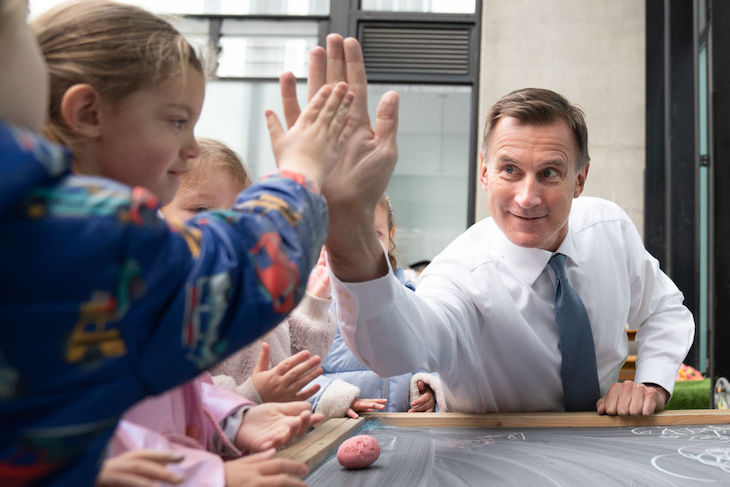Jeremy Hunt has announced plans to extend the 30 hours a week of ‘free’ childcare for three and four year olds to include babies as young as nine-months old. This expansion of childcare provision has been hailed by the Chancellor as a measure to allow mothers to return to employment if they want to; it will also, according to Hunt, help boost the economy. But has anyone paused to think about the impact on the children themselves – and families?
The truth is that Hunt’s proposed changes aren’t a win for mothers, children, and families as a whole. Why? Because the childcare plans suggest that a mother’s worth comes from their economic output and active participation in the workforce. It also falsely assumes that children are better off with hired help than a loving parent at home. In short, mothers’ preferences and baby bonding get sacrificed in the name of economic growth, and babies and toddlers get designated as ‘barriers to work’ that mothers need to overcome.
The suggestion that Hunt’s measures enable choice for mothers should fool nobody
When Hunt proclaims childcare that prevents women from working is ‘damaging the economy’, he epitomises the worst of today’s anti-natalist sentiments. He presents children as a burden: a burden to mothers as it hinders their economic contribution to society, and a burden to the state given the economic inactivity they have hastened. At a time when women are waiting longer to have children and not having as many as they’d like, Hunt might have chosen to pick his words a little more carefully.
The childcare reforms make one thing clear: Hunt does not believe a woman’s place is in the home, but wherever she will give the biggest boost to the economy. This disregard for stay-at-home parents and the integrity of the family for the sake of government balance sheets reveals an inverse subordination between government and people. The state should serve families, not families the state. Yet here the virtues of family and home life get side-lined in the name of profit and GDP. Heaven forbid a mother would rather stay home with her child.
The creep of government into children’s lives by minimising the time spent by parents with their children does not mark progress, but points to a series of failed policy attempts to support families. Of course, it’s important that we remove financial barriers to having children, but it’s a sad state of affairs if parents are then incentivised away from raising those children.
The suggestion that Hunt’s measures enable choice for mothers should fool nobody. No provision has been made to support parents who would rather steer clear of the hired help route. And the extended number of free hours of childcare makes the financial cost of staying at home with one’s children nonsensical from a financial standpoint. Mothers who opt to care for their children themselves rather than outsourcing that responsibility to a nursery will face a significant loss of potential earnings. This is simply not an option for so many families.
As it stands, mothers already significantly contribute to the economy – few can afford to stay at home. ONS Data for 2021 revealed employment rates for mothers and fathers were higher than for either men or women without dependent children. It had been this way since 2017. And the employment rate for mothers had been higher than for women without dependent children since 2007. Some of these parents may work because they enjoy it and derive meaning from it, but many will not. The two-income trap means many parents work because they are dependent on extra income. The new proposals add fuel to this fire.
A pro-woman, pro-family policy would not seek to export mothers to employed labour as soon as their already-stingy maternity pay ends; such measures seldom serve the interest of the mother or baby. Instead, Conservatives should focus on combating the two-income trap so that mothers, and fathers, can spend the time they want to with their children.
Most adults wish they spent more time with their families, not more time at work. More than six in ten women think it is better for children to spend time primarily with a parent until their second birthday, compared with only a quarter of women who think children should enter formal childcare as soon as they are able. There is extensive research that shows children develop best when they have a parent present during their early years.
Yesterday Hunt said ‘Conservatives believe work is a virtue’. It’s time they counted family work among that and help those mothers who wish to look after their children themselves do just that.






Comments